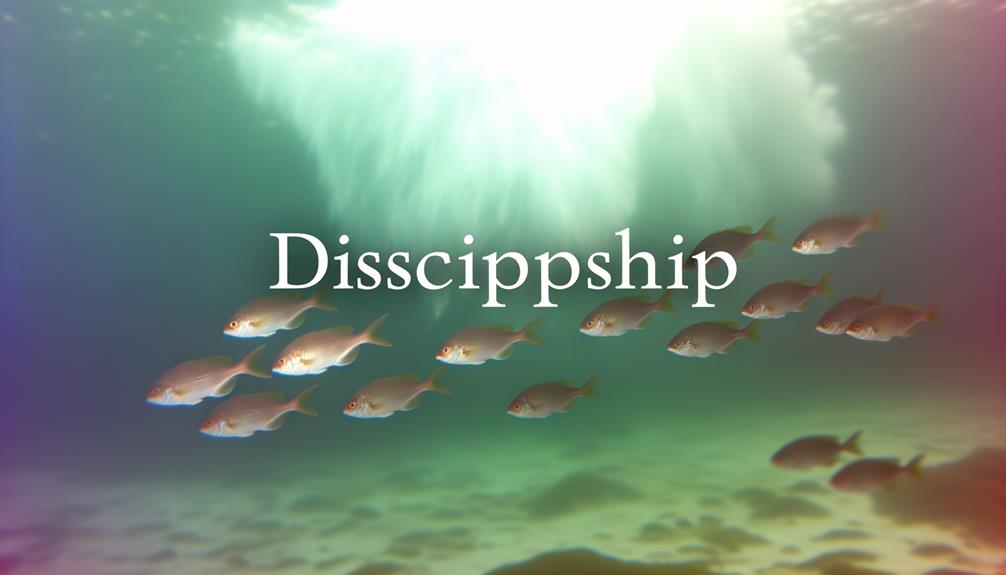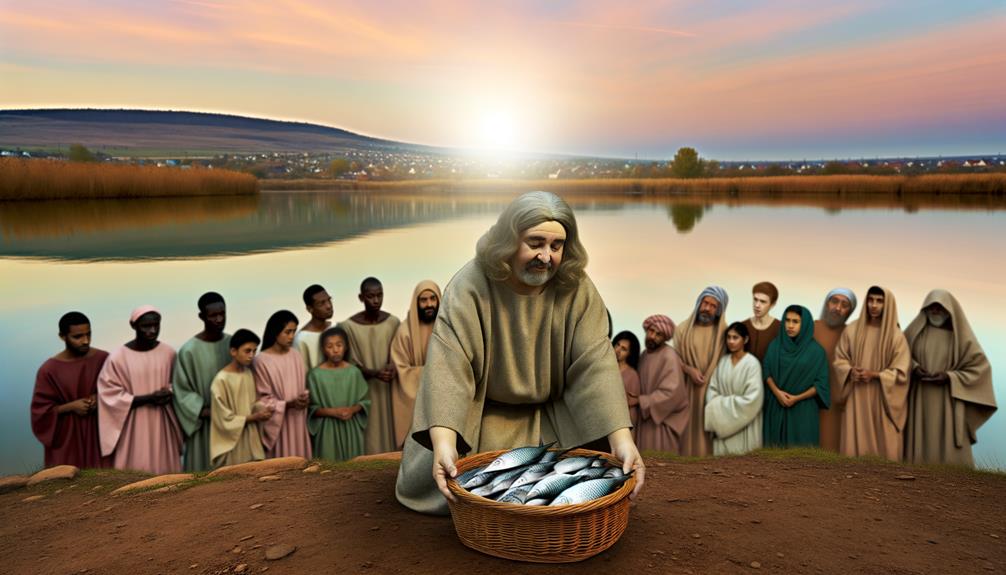Fish Symbolic Meaning in the Bible: Abundance and Faith!
In biblical scripture, fish mainly symbolize divine provision, spiritual nourishment, and the mission of evangelism. The miraculous multiplication of loaves and fishes demonstrates God’s generosity and ability to meet human needs (Matthew 14:13-21).
Fish also serve as metaphors for evangelism when Jesus calls His disciples to be ‘fishers of men‘ (Luke 5:1-11). The story of Jonah and the great fish illustrates themes of repentance and divine intervention.
In addition, the Ichthys symbol, an early Christian emblem, reinforced communal identity and faith under persecution. Each scriptural instance layers the meaning of fish with rich theological and historical significance, illuminating deeper truths.

Key Takeaways
- Fish symbolize divine provision, as seen in the miraculous multiplication of loaves and fish in Matthew 14:13-21.
- The miraculous catch of fish in Luke 5:1-11 represents divine intervention and the call to discipleship.
- Fish are metaphors for evangelism, illustrating the mission to gather believers into God’s Kingdom.
- The Ichthys symbol, meaning ‘Jesus Christ, Son of God, Savior’, was a coded affirmation of faith among early Christians.
Biblical Symbolism of Fish: Faith, Abundance, and Spiritual Transformation
| Symbolism | Meaning | Explanation |
|---|---|---|
| Faith and Discipleship | Represents faith in Christ and the calling of discipleship. | Jesus called His disciples “fishers of men” (Matthew 4:19), symbolizing the spreading of the gospel and bringing others into the faith. |
| Abundance and Provision | Signifies God’s provision and blessings. | In the miracle of the loaves and fish (John 6:1-14), fish symbolize God’s ability to provide abundantly, even when resources seem limited. |
| Jesus Christ (Ichthys Symbol) | Represents Christ and early Christian identity. | The Greek word for fish, “Ichthys,” was used as an acronym for “Jesus Christ, Son of God, Savior.” It became a symbol for early Christians. |
| Spiritual Nourishment | Symbolizes spiritual sustenance and life. | In biblical stories, fish often represent nourishment and life, such as in the feeding of the five thousand, where Jesus provided both physical and spiritual sustenance. |
| Transformation and Renewal | Reflects transformation through faith and God’s grace. | The fish represents the transformation that occurs through belief in Christ, as seen in stories of Jesus and His disciples guiding people toward spiritual renewal (Luke 5:10). |
The Miraculous Catch

In the Gospel of Luke, the miraculous catch of fish serves as a profound narrative that underscores the divine authority of Jesus and the abundant blessings that follow obedience to His word.
This episode occurs in Luke 5:1-11, where experienced fishermen, having toiled all night without success, are instructed by Jesus to cast their nets once more. Their subsequent overwhelming catch not only signifies divine intervention but also highlights the transformative power of faith and trust in Jesus’ command.
Historically, this event resonates with the socio-economic realities of first-century Galilee, where fishing was a primary livelihood.
Theologically, it prefigures the mission of the apostles, who, like fishers of men, would gather souls into the Kingdom of God, emphasizing evangelism and divine provision.
Fish and Provision

In the biblical narrative, fish frequently symbolize divine provision, as exemplified in the miraculous multiplication of loaves and fish to feed the multitudes in Matthew 14:13-21.
This theme is further underscored by the abundant catch experienced by the disciples in John 21:6, which signifies God’s ability to provide abundantly beyond human effort.
Historically, these episodes underscore the theological principle that God meets the needs of His people, often in unexpected and miraculous ways.
Miraculous Fish Multiplication
The miraculous multiplication of fish, as recounted in the Gospels, serves as a profound witness to divine provision and the abundance that flows from faith in God’s power. This event, recorded in all four Gospels, vividly illustrates God’s ability to meet human needs in seemingly impossible situations.
Theologically, it emphasizes:
- Divine Compassion: Jesus’ concern for the physical sustenance of the crowd.
- Faith Activation: The small offering of five loaves and two fish was transformed through faith.
- Messianic Identity: Jesus’ miracle affirmed His identity as the Messiah who provides.
Historically, this miracle resonated deeply with early Christians, reinforcing their belief in Christ’s boundless provision.
Disciples’ Abundant Catch
Following the miraculous multiplication of fish, another significant event illustrating divine provision is the disciples’ abundant catch, which underscores the themes of obedience, faith, and the fulfillment of Jesus’ promises.
In John 21:6, after a night of unsuccessful fishing, Jesus instructs the disciples to cast their net on the right side of the boat. Their compliance results in a miraculous catch of 153 fish, symbolizing God’s provision and the fruitfulness of following Christ’s guidance.
This episode not only highlights the disciples’ dependence on divine instruction but also serves as a post-resurrection affirmation of Jesus’ continual presence and support.
Historically, this narrative reinforced early Christian communities’ faith in divine abundance amidst their missionary endeavors.
Jesus and the Fishermen

Jesus’ calling of the fishermen as His disciples serves as a profound illustration of His mission to transform ordinary lives into carriers of divine purpose. In the biblical narrative, Jesus approaches Simon Peter, Andrew, James, and John by the Sea of Galilee, inviting them to become ‘fishers of men’ (Matthew 4:19).
This act underscores several theological and historical insights:
- Divine selection of the humble: Jesus chose ordinary fishermen, emphasizing God’s preference for humility.
- Symbolic transformation: The fishermen’s nets become metaphors for evangelism and spiritual outreach.
- Immediate obedience: The disciples’ swift response signifies the power of Jesus’ call.
These elements collectively reveal the depth of Jesus’ intention and the transformative nature of His ministry.
The Loaves and Fish

In a miraculous demonstration of divine provision, the feeding of the five thousand with loaves and fish (John 6:1-14) encapsulates profound theological themes of abundance, faith, and community.
This narrative, central to the Gospels, reveals Jesus as the sustainer of life, echoing the Old Scripture manna.
The multiplication of a modest offering into a feast for thousands symbolizes God’s boundless generosity and the sufficiency of faith.
The act of distributing food among the masses fosters a sense of unity and shared blessing, reinforcing the communal aspect of the Kingdom of God.
Historically, this miracle foreshadows the Eucharistic celebration, where simple elements are transformed into a means of divine grace and spiritual nourishment.
Jonah and the Great Fish

The theme of divine intervention continues with the story of Jonah and the great fish, illustrating God’s sovereignty and the transformative power of repentance.
In the Book of Jonah, the fish is a divine instrument used to redirect the prophet’s disobedience and highlight themes central to biblical theology:
- Divine Mercy: God’s willingness to forgive those who repent, as seen in Nineveh’s eventual salvation.
- Providence: The fish is a means through which God’s plan is executed, showcasing His control over creation.
- Repentance: Jonah’s ordeal in the fish symbolizes a period of reflection and contrition.
This account profoundly underscores the intricate dynamics between human agency and divine will.
Fish in Early Christianity

While traversing the perilous early centuries, early Christians adopted the fish symbol, known as the Ichthys, to subtly convey their faith and identity amidst persecution. This emblem, derived from the Greek word for fish, became a covert signifier of Christian beliefs. Scriptural references, such as Jesus’ call to His disciples to be “fishers of men” (Matthew 4:19), further solidified the fish as a potent Christian symbol.
| Aspect | Description |
|---|---|
| Symbolic Meaning | Covert identifier of Christian faith |
| Scriptural Basis | Referenced in Jesus’ teachings and parables |
| Historical Context | Used during periods of persecution |
In this historical context, the fish not only represented Christ but also served as a communal bond among believers, fostering a sense of unity and shared mission.
Ichthys Symbolism

Adopting the Ichthys symbol encapsulates a profound theological message, intertwining Christological significance with early Christian identity and resilience. This symbol, resembling a simple fish outline, was not merely an artistic choice but a coded affirmation of faith. The Greek word ‘Ichthys’ (ΙΧΘΥΣ) serves as an acronym for ‘Jesus Christ, Son of God, Savior,’ embedding a rich Christological declaration.
- Historical Context: Early Christians used the Ichthys to discreetly identify themselves.
- Scriptural Analysis: The fish motif resonates with biblical narratives, especially in the feeding of the multitudes.
- Theological Insight: The symbol underscores the early church’s emphasis on Christ’s divine nature.
- Resilience: The use of Ichthys during persecution highlights the steadfast faith of the early believers.
Fish as Discipleship

Building upon the profound theological resonance of the Ichthys symbol, the imagery of fish extends into the concept of discipleship, where Jesus famously calls His followers to become ‘fishers of men.’
This call, recorded in Matthew 4:19, signifies a transformative mission rooted in ancient Judaic traditions of teaching and proclamation.
Fishing, a common livelihood in Galilee, served as a powerful metaphor, illustrating the shift from ordinary labor to a divine vocation.
Historically, this metaphor emphasized the expansive reach of the Gospel, transcending cultural and geographical boundaries.
The disciples’ acceptance of this call demonstrates a radical commitment, symbolizing the spread of Christian teachings and the growth of early Church communities through dedicated evangelism and spiritual mentorship.
Spiritual Nourishment

Drawing from the plentiful biblical references, the symbol of fish also embodies the concept of spiritual nourishment, encapsulating the sustenance provided by Jesus through His teachings and miracles. This nourishment transcends physical sustenance, offering deeper spiritual insights and eternal life.
Key scriptural instances highlight this symbolism:
- John 21:9-13: Jesus prepares a meal of fish for His disciples after His resurrection, symbolizing spiritual revitalization.
- Matthew 4:19: Jesus calls His disciples to be ‘fishers of men,’ implying the sharing of spiritual sustenance.
- Mark 6:41: Jesus blesses and breaks the fish to feed multitudes, signifying divine provision.
These narratives collectively underscore fish as an emblem of Jesus’ spiritual nourishment.
Multiplication of Fish

The multiplication of fish in biblical narratives, most notably in the feeding of the five thousand, serves as a profound proof of Jesus’ divine authority and His ability to provide abundantly from seemingly limited resources.
This miraculous event is detailed in all four Gospels (Matthew 14:13-21, Mark 6:30-44, Luke 9:10-17, John 6:1-14), underscoring its theological importance.
Historically, the act of multiplying fish and loaves reflects God’s provision for Israel, reminiscent of manna in the wilderness.
Theologically, it symbolizes the boundless generosity and compassion of Christ, who meets both physical and spiritual needs.
Scripturally, the fish represent sustenance and life, reinforcing the message that faith in Jesus reveals divine abundance, transcending earthly limitations.
Fish in Biblical Parables

In the parables of Jesus, fish often serve as potent symbols for the Kingdom of God and the mission of His disciples.
The calling of fishermen to be His followers underscores their new role as ‘fishers of men,’ tasked with spreading the gospel.
Moreover, the miraculous catch of fish not only displays divine provision but also symbolizes the abundant and inclusive nature of God’s salvation.
Fishermen as Disciples
Jesus’ calling of fishermen as His disciples underscores the profound symbolic significance of fish and fishing in His parables, illustrating themes of evangelism, provision, and the Kingdom of God. This deliberate choice highlights the following theological insights:
Evangelism: Jesus transforms His disciples into ‘fishers of men’ (Matthew 4:19), signifying their mission to gather believers.
Provision: The nets symbolize God’s abundant provision, as seen when the disciples catch a miraculous amount of fish (Luke 5:6).
Kingdom of God: The act of fishing parallels the gathering of souls into God’s Kingdom, akin to sorting good fish from bad (Matthew 13:47-48).
Historical Context: Many early disciples were fishermen, connecting Jesus’ teachings to their everyday experiences and making His message relatable and profound.
Miracle of Multiplication
Building upon the symbolism of fishermen as disciples, the miracle of multiplication in biblical parables further reinforces the theme of divine provision and abundance through the miraculous feeding of the multitudes.
In the Gospels, Jesus feeds thousands with a few loaves and fish, illustrating God’s boundless generosity (Matthew 14:13-21; John 6:1-15). This act not only meets immediate physical needs but also symbolizes spiritual nourishment provided through Christ.
Historically, this miracle echoes Old Covenant precedents such as manna in the wilderness (Exodus 16), emphasizing continuity in God’s care for His people.
Theologically, it underscores the Kingdom of God as one of abundance, where divine grace suffices for all. Consequently, fish in this setting signify God’s miraculous capacity to provide beyond human limitation.
Catching Souls Symbolism
Through the metaphorical language of fishing, biblical parables often depict the act of evangelism, where believers are called to be ‘fishers of men’ (Matthew 4:19), signifying the mission of spreading the Gospel and bringing souls into the Kingdom of God. This symbolism is rich in theological insight: Just as a fisherman carefully selects the right bait to catch a specific kind of fish, believers are called to tailor their approach to reach different people with the message of salvation. Additionally, the biblical meaning of deer panting for water (Psalm 42:1) is often used to convey the deep spiritual hunger and thirst for God that believers should strive to satisfy in those they seek to bring into the Kingdom. Just as a deer earnestly longs for water, so too should believers seek to lead others to the source of true spiritual fulfillment.
- Scriptural Analysis: Jesus’ call to Peter and Andrew emphasizes proactive discipleship.
- Historical Context: Fishing was a familiar occupation, making this metaphor relatable.
- Theological Insight: Evangelism is depicted as a divine calling.
Understanding this symbolism underscores the importance of evangelism, illustrating the transformative journey from earthly to spiritual pursuits, and highlighting the integral role of believers in this divine mission.
Conclusion
The recurring presence of fish in biblical narratives reveals a profound theological significance, intertwining themes of provision, discipleship, and divine intervention.
Coincidentally, fish appear in critical moments of sustenance and spiritual instruction, from the miraculous catch to the feeding of multitudes. This symbolism underscores God’s providence and the call to follow Christ.
The consistent use of fish in scripture not only reflects historical context but also invites deeper scriptural analysis and theological reflection.






